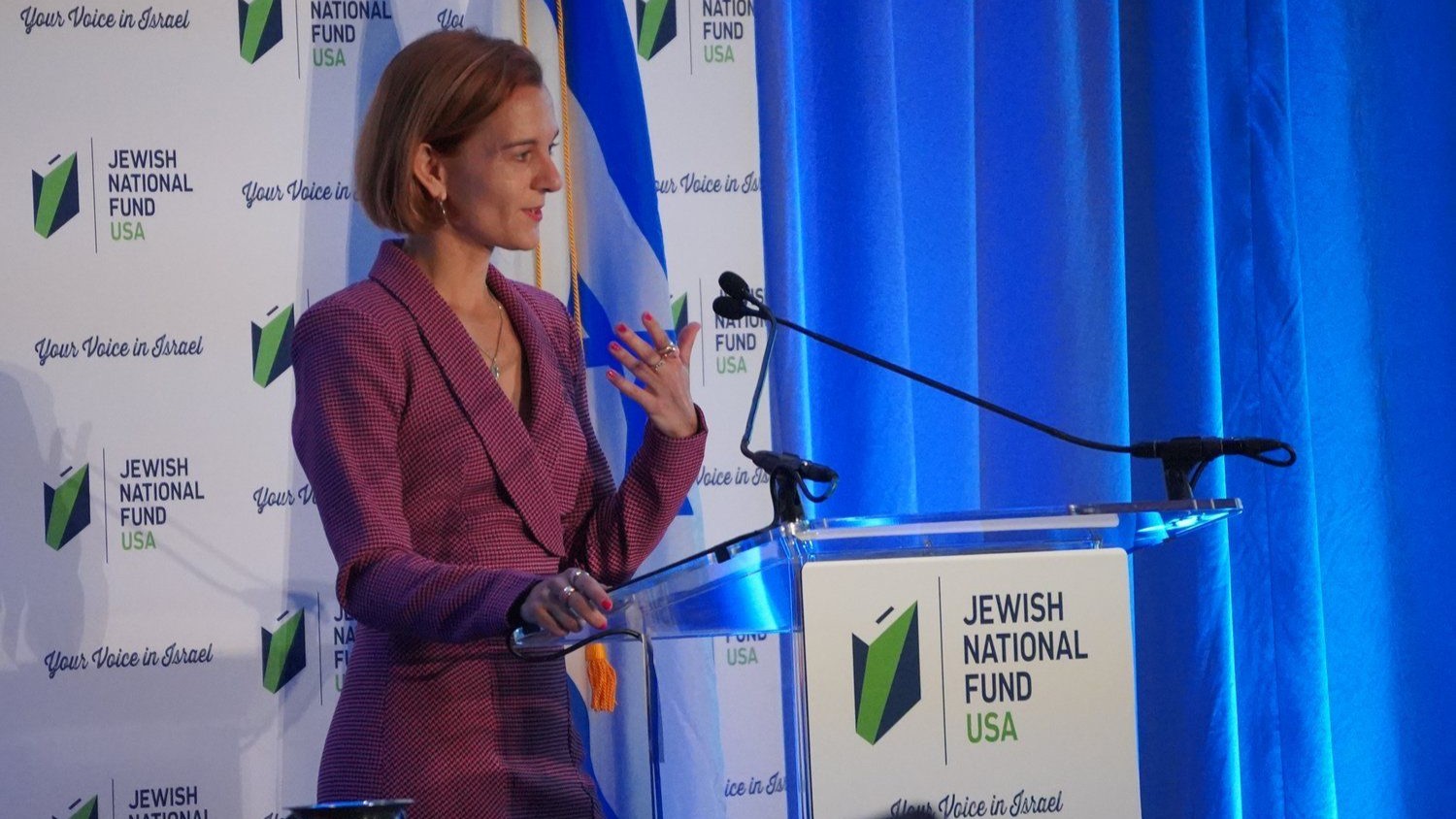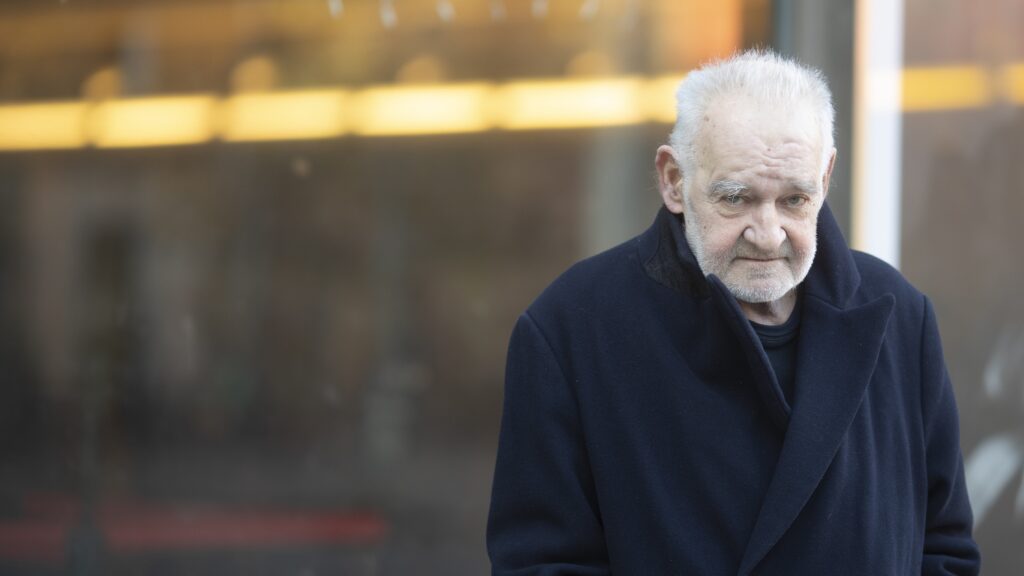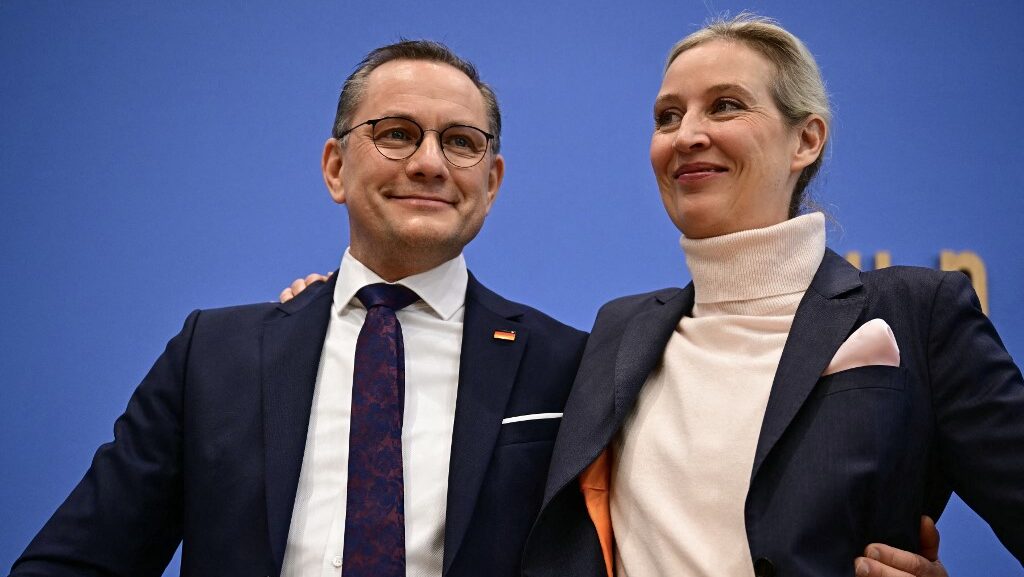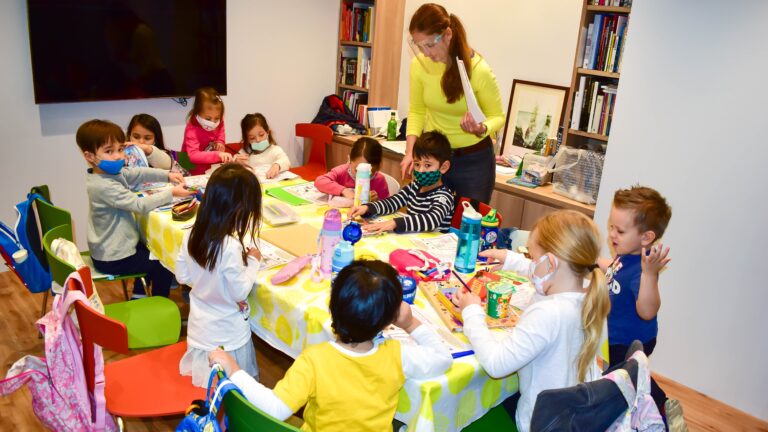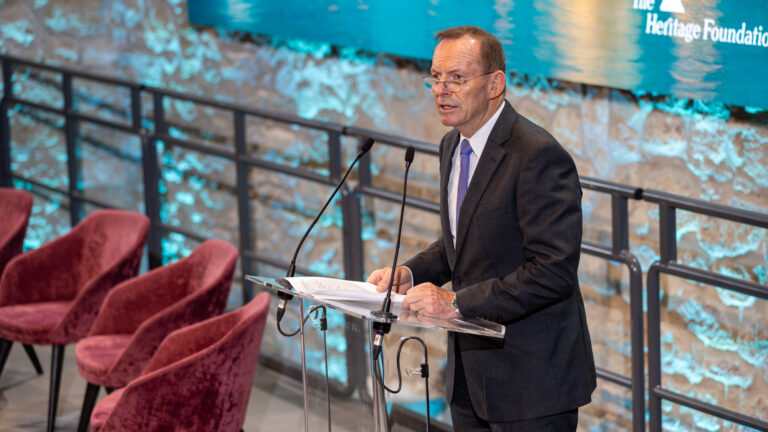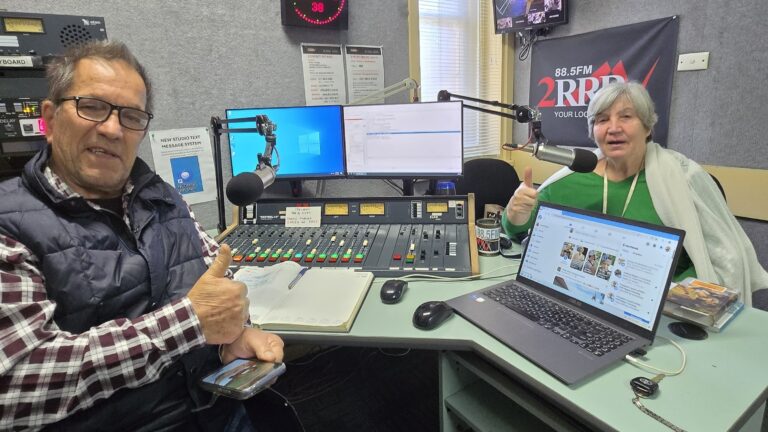Virág Gulyás is a distinguished public speaker, international Jewish affairs specialist, and mindful activist. Though not Jewish herself, she has dedicated her career to combating anti-Semitism and promoting Jewish rights. She served as a diplomat to the European Union during Hungary’s Presidency of the EU and worked at the United Nations through the Touro College Institute on Human Rights and the Holocaust. She played a pivotal role in launching the now prominent movement #EndJewHatred. Ms Gulyás’s commitment to activism extends beyond personal passion; she holds a master’s degree in Jewish studies from Touro University, Manhattan, and has spent the past decade working with various non-profits in the U.S., Israel, and Europe on campaigns against anti-Semitism. She was recently named one of the 18 Prominent Zionist Women in the USA by Hadassah, and currently leads the JNF-USA Speakers Bureau, and continues to speak to audiences locally and internationally.
***
What led you to become a pro-Israeli activist?
I definitely didn’t grow up a Zionist. Actually, that was the furthest thing from me. Zionists and what Zionism is had a very negative connotation for me, which I think was rooted in a lot of ignorance. I was born in 1985, in a totally different era when it was not necessarily in our curriculum to learn about what Zionism is, we learned about the Holocaust, but that was about it. For me, the big change came when I met an Israeli, and even though that relationship is not something I have today, that was the first domino into a whole journey of mine. Slowly but surely, I started to dig deeper into ‘What do I know or think about Zionism?’ and I realized that it was not only that I wasn’t a Zionist, but I was the complete opposite. I really held very strong antisemitic stereotypes in me. I’m not using this as an excuse, but I was a product of my environment. Going back to the 1990s, we knew a lot of Jewish jokes. Next to the classical ballet school where I studied there was the famous synagogue in Budapest, so our projection of the Jewish community was that everyone was an Orthodox Jew, just going to the synagogue, and that was it. Also, in Hungarian culture, even today you don’t ask who is Jewish, and who is not. So, in hindsight, I know that many of my classmates in ballet school were Jews, but back then, I had zero idea about it.
To cut the story short, I started going to Israel, and during the last decade, I visited the Jewish state 26 times, and every time I just learned something more about Israel, Zionism, the Jews, and myself as well. In Hungary many people are ignorant of what Zionism actually is. I always try to compare our nations’ pasts: we had 1848, then we had 1956, and every crucial moment in Hungarian history that is about fighting for sovereignty is basically Zionism, just under a different name. The moment we understand that our attempt to be a sovereign Hungarian nation is no different than the Jewish civil rights movement, which is Zionism, then I think it’s more comprehensible for the audience at large.
What does Zionism mean to you?
Personally, I’m not approaching Zionism based on the Bible; my Zionism is based more on the human and civil rights aspects. So again, it means that
Jewish people are seeking their sovereignty, that they have the legitimate right to exist, and exist in the area where it has been proven that their roots are.
I believe that with today’s generation that has a three-second attention span we cannot really start talking about what happened 3,000 years ago because they don’t even know what happened ten years ago. So, what I’m trying to do is find an element in everyone’s history that is very similar to the Zionist endeavors.
The October 7 attacks showed again that most pro-Israeli activists around the world are mostly either Jewish or Christian activists, and it’s rare that a non-religious and non-Jewish activist advocates for Zionism. What is your take on this phenomenon, and how could it be changed?
It’s a complex question, and I want to divide it to talk separately about Hungary and America because they are very different. I think the situation in Hungary is not as bad as in America or in Western Europe, and the statistics clearly prove that. I wouldn’t say that we don’t have problems, but there is a really big difference between Jewish jokes, stupid Jewish comments, and throwing a Jew out of the window like in France (see Sarah Halimi’s case), which has happened more than once.
The U.S. is a very different place, partly because of the larger number of Jews, but first and foremost for intertwined cultural and educational reasons, the Ivy League universities, and so on. So there, we really have problems, and October 7 brought things to the surface even more. It’s really difficult to influence people because the more you tell them what to believe, the more they push back. And I do not think that is our job: to tell people what to think. Our job is to motivate them to think. For instance, let’s say someone does not like Israel for whatever reasons; if that person wants to remain a critical thinker, then he can still say our enemy is Hamas, a terrorist organization, and won’t automatically get into the nonsense of how Israel is an apartheid, etc. The issue is when someone gets blinded by hatred so much that they are not capable of telling good from evil.
However, after the October 7 attacks, and the shocking levels of antisemitism, anti-Zionism and anti-Israelism, I firmly believe that we will bounce back. Americans, even though they might have been at the rally against Israel a couple of months ago, are starting to get fed up with the burning of not only the Israeli but also American flag. People are fed up that major highways are blocked by people waving Palestinian and Hamas flags. So, it might change not because they love Israel or the Jews but because they start to feel that this hatred is affecting them as patriotic Americans as well. The moment it hits home, people look at things differently, and slowly but surely, they will understand what Israel is facing. I firmly believe it must bounce back as we overstretched way too many things, especially in the US, and it cannot go further than this. Otherwise, we will really be heading for the next world war.
October 7 is a day many people will never forget. Similarly to 9/11, many of us will remember when and where we were when we first saw the brutality of Hamas’s attack in the news. Can you walk our readers through how you reacted to October 7 and whether your activism changed after that?
It’s so interesting that you bring up the parallel between 9/11 and 10/7 because this is how I started my speeches this past year, asking the audience, ‘Do you remember where you were on 9/11?’ and everyone, especially Americans, raised their hands because it was such a crash of the trust in the system and their safety that they all remember. Then I also asked, ‘Do you remember where you were on October 7?’, and interestingly enough, the same amount of people raised their hands once again because even if you are not Jewish or not Israeli, it really shook you to the core that something like that could happen. Even if you’re a Palestinian sympathizer on the street, you’ll still remember what happened or where you were.
As far as I’m concerned, I was in Colorado, that’s about nine hours’ time difference. When I woke up, I was scrolling on my phone, and I started to see the news, and I thought it was just one more attack like the ones we usually have, to which, unfortunately, we got used to. Then I read on, and I remember sitting on the bed for about half an hour, completely frozen. Then I started to look at the video footage and messages from my friends, and I was in denial that it could not be that we were really facing this much evil. Then the biggest shock came the next day when instead of talking about Israel and the victims and the hostages, there were already riots against Israel on the streets. You can hate Israel, you can hate Jews as much as you want, but you didn’t even give them one day to mourn those people. I think that is a huge moral and social crisis that we are facing. We often talk about how the Holocaust could happen again, and since October 7, this is a big narrative that we are discussing. Since 8 October it is clear that some people would still be okay with rounding up Jews and sending them to the gas chambers. That should be a wake-up call for everyone.
How have you dealt with the antisemitism and the levels of hatred since October 7 when they were directed at you as you held speeches or attended pro-Israeli events?
There is nothing new about that. I mean that what we see, especially in America, is not a novelty. Whoever has been around the Jewish community for the last decade has felt this already. So, I’ve been attacked before; I needed to call the police before because I got death threats to the extent that I didn’t feel safe. My events were boycotted in New York City even before October 7. What stunned me was how many people felt that this was new and shocking. I think people just didn’t really see (or wanted to see) what was going on. So many Jews and non-Jews alike were just shrugging off the things that the nonprofits I have worked with for the last decade tried draw attention to. What has been going on at Columbia, how the professors are treating Jewish students, how they wouldn’t give you a letter of reference if you were a Zionist, all this has been normalized to the extent that it led to the recent encampments. So, when you normalize the narrative against Jews and Zionists so much that it is engrained in people that it’s okay to hate them, and there are no consequences, that’s when we end up seeing what happened a couple of months ago at the Ivy League colleges in America.
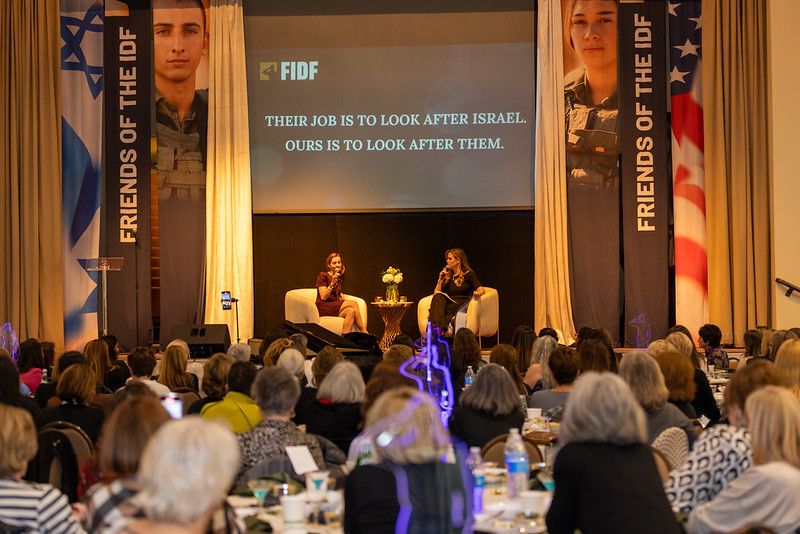
For me, it was not necessarily shocking. I did have an event where I needed a police officer beside me 24/7 because I was one of the speakers, and they plastered the streets with my photos on posters all around Denver and Boulder (Colorado), saying that I’m a colonizer, a genocide-committing baby killer, and whatnot, so because of the amount of aggression on the streets, they said it’s better if I had protection 24/7, which is insane if you think about it. Protesters were banging on the window of the conference hall, they were shouting at us, and even more shockingly, they were shouting at high school kids things like ‘Hitler should have finished the business, and you should die.’ So, this was a wake-up call for Jewish people that anyone who is a Jew is in danger.
You are currently staying in Budapest. How does Hungary differ from the U.S. in terms of antisemitism, and how can this growing phenomenon be stopped from reaching Hungary?
The difference is huge. I’ve been in Budapest now for the fourth week, and the fact that I’m not seeing all these rallies, Palestinian flags, the violence against Jews and their allies, and the anti-Israel stickers, make it a refreshing place to stay. And because I am who I am, I never miss an opportunity to ask a visibly Jewish person who passes me how they feel here in Hungary because I want to see how the locals feel. I have concluded that the situations are not even comparable.
I think Hungary has the big advantage that
we apply the law and thus you cannot have pro-Hamas and pro-Palestinian marches, because Hamas is a designated terrorist organization, and you cannot support a terrorist group openly.
From an American perspective, they say this is not free speech; the way I see it, it is free speech, because you can believe that Palestinians have all the rights in the world and you can go to the street for that, but the moment you are waving a terrorist organization’s flag, that is inciting hatred. Also, the moment you say, ‘from the river to the sea, Palestine will be free’, which has been, again, a slogan of Hamas, and means that they just want to eliminate Israel, you are not practicing free speech, but fueling hatred and calling for the destruction of Israel.
And to stay with Hungary: there is lots of unjust hatred against us. And you can dislike our government, but you need to be morally and intellectually correct and honest to say that in Budapest, Jewish people can wear their kippahs, and I can wear my Star of David necklace, which I have to hide in New York.
In the U.S. the educational system was hijacked by Iran and Qatar, and therefore, professors are talking about Zionism as colonization. This generation sees the world as the colonized and the colonizers, black and white, rich and poor, and doesn’t like to see the shades of grey and the nuances, which is why they don’t have the desire and the attention span to go deeper. So, they look at Jews as the white colonizers, the rich people, and the Palestinians as the people of color, the poor, and the oppressed; there is no way to get around this narrative if the education system for four years is instilling this into you.
This leads to how we can prevent this from happening in Hungary. First and foremost, let’s not accept money from Qatar and Iran and likes for our universities. I think Hungary and Hungarians in general, regardless of our political differences, have been really careful that other groups of people or other countries wouldn’t hijack us again—after all we suffered under the Soviet regime. I feel that even the most anti-Orbán person would freak out if people on the streets of Budapest started burning Hungarian flags and would feel that as a crossing of a red line. What we saw in the U.S. is that most of these marches were led by either second-generation immigrants who came from Iran and Qatar or other Muslim countries, or they are there as foreign students on a student visa. That is a huge issue and is something we really need to be strong about and bring consequences to that by revoking their student visas and stopping them from entering our country. We have the right to do that.
You recently posted a video about how you get hatred because of your Hungarian nationality. Could you elaborate on it and whether is it a common phenomenon in the U.S.?
I think the big problem is our polarization. This means that in the U.S. if you say that you are a Trump supporter, you are ‘lynched’. If anyone says, ‘oh, the war between Ukraine and Russia is not clearly Russia’s fault, and it’s not about the poor Ukrainians only’ then you’re also ‘lynched’; and because Orbán is very much lumped in with Putin and Trump, the assumption is immediately that if I’m a Hungarian, I must hate my government. I think it’s huge arrogance from an American audience, and I’m very clear about it, which is probably why I’m more of a controversial speaker.
When they ask me to speak about antisemitism in Hungary, I am not going to sit there and nod along at all the incorrect assumptions. I’m going to stand up for my country, which is shocking for many Americans because they just assume that I hate Orbán and Hungary is a horrible place and Hungary is the epicenter of antisemitism. For me, being a Hungarian always comes first. I’m one of those people who live abroad not because Hungary is a horrible place. I think so many things are better here than in America. Simply, my career led me to the U.S., but I’m the one who would put on the cockade on 15 March and who, instead of going to Halloween parties, celebrates All Saints Day by lighting a candle for my grandparents. It is not easy because it’s one thing to stand up for the Jewish communities and get hatred for that, but then also get hatred because I’m Hungarian and most people are still stuck in 1944.
The Hamas propaganda war is conquering the Western media as well, especially among the younger generations. How can you effectively engage and reach the broader public by debunking the lies of Hamas’s propaganda?
I think that is the most difficult question that we can ask today. I don’t think anyone is really succeeding, and if they say that they do, it’s lie; I’ll tell you why. Before October 7, I believed that it was possible to change people because I went through my transformation. I still feel that people who are just ignorant and they admit that can still be changed. However, those people who are burning Israeli and American flags are not the people that we can reach today, as the emotions are so heightened that there is no way to the brain. You cannot influence emotions with rational thoughts, that doesn’t work psychologically. So, I think today, we just need time, and time will help us change. Those people who joined the encampments, the rallies and so on, are really brainwashed by Aljazeera, and we have no way of talking to them.
I think the Jewish community should have been more assertive about saying ‘no’ and not letting their goodwill backfire at them. What I mean is that the Jewish community does so many good deeds; they were and are always behind the black communities, and the black communities in America are free today partly thanks to the Jewish community. They stood up for the LGBT community, they always marched with the women, and they were always there for others, but now, when they needed the others, they are left alone. I think this was a huge slap in the face for the Jewish community that their solidarity was not reciprocated, which is truly tragic. Today, if you say anything against Jews or Zionists, there are still no consequences, or barely. However, if you say anything against a black person, you’re immediately branded a racist; if you say anything about a gender-fluid person, you’re immediately labelled a transphobe, and you’re canceled. But Jew-hatred is still normalized in an absurd way. It is something that we need to change, and it’s shocking that October 7, with the massacre of so many Jews and non-Jews, Arabs and Druze, and Christians, was not enough to change it.
Related articles:

